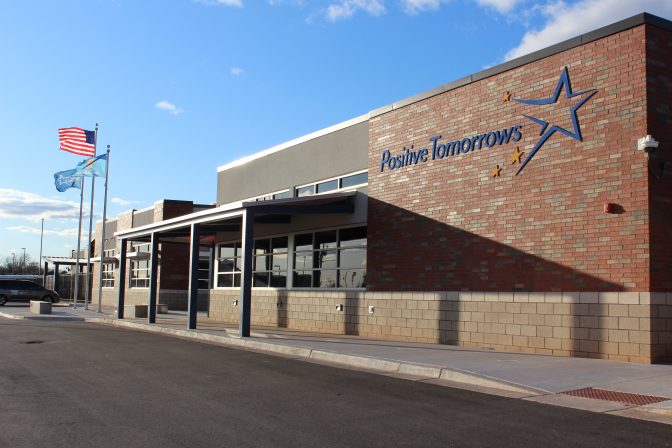
A group of students play on the playground of Positive Tomorrows, Oklahoma's only school for students experiencing homelessness.
Courtesy Positive Tomorrows


A group of students play on the playground of Positive Tomorrows, Oklahoma's only school for students experiencing homelessness.
Courtesy Positive Tomorrows
Susan Agel always knew distance learning wasn’t going to work for her students.
She’s President of Positive Tomorrows, Oklahoma’s only school geared toward students experiencing homelessness. And distance learning wasn’t really cutting it.
“We know that for the children that we serve, it’s really important for them to have face to face school,” she said.
Last spring, they made it work. Teachers and case workers even visited students where they lived to do welfare checks. The school became more of a warehouse to distribute meals and other supplies across Oklahoma City, where Positive Tomorrows is located.
“The thing that’s weighed heaviest on me is just making sure that everyone’s safe, that everybody’s getting fed and that, we’re doing what we need to do, taking care of what we need to do, but that we’re doing it in a safe manner,” she said.
That’s meant a strict mask mandate for all students, staff and visitors. It also meant spreading out.
Positive Tomorrows’ building was completed in 2019 and was designed to grow its student body to fill a capacity of more than 200. Now, there are a little less than 100 students in the space.
The measures seem to have paid off. The school has only had to quarantine one classroom over the course of the school year and other positive cases appear to have come from outside the school.
In fact, many of the challenges the school faces come from the larger effects of the coronavirus, Agel said.

Courtesy Positive Tomorrows
Positive Tomorrows School
The economic wreckage of the pandemic left many parents of the schools’ students in even more precarious financial situations. And Agel said neglect is on the rise.
Students are only supposed to spend a couple years at Positive Tomorrows. The elementary and middle school is designed to help families break the cycle of poverty and return their children to traditional public schools. At Positive Tomorrows the social services some families might rely on from several agencies all come from the school, said Kelly Berger, director of family support.
“Here all the programs are interconnected,” he said.
That means the building isn’t just for students. There are resources to help families find housing and jobs. There are showers and laundry machines families can use. There are transportation services. But Berger said COVID-19 threw that into flux.
“Well, my normal job went on, as usual, trying to help families, you know, overcome homelessness, get and stay housed,” he said.
Many of the students’ families worked in the service industry so many lost their jobs, Berger said. Positive Tomorrows had to take several actions to help them.
“It becomes very challenging without support, so we had to figure out how can we safely get out there and still support them and get them to those basic needs so they can keep their appointments, find a place to live, get their rent paid in a way where we were also not exposing our staff to any unnecessary risk,” he said.

Courtesy Positive Tomorrows
Positive Tomorrows Elementary School teacher Sue Gill teaches in her Oklahoma City classroom.
A significant amount of the individual work fell on elementary school teachers like Sue Gill. She visited her students regularly last spring when school closed and has been in the classroom since the fall when Positive Tomorrows reopened.
“It was a little scary,” she said. “But our leadership and everybody had worked tirelessly over the summer to try to get this going so that we could be back in person.”
The school’s mission meant there were unique risks. It also meant that reopening was top priority. Positive Tomorrows couldn’t wait and see if in person schooling was safe. They had to be one of the leaders.
And since coming back the fears of in person learning melted away. Gill says students are wearing masks and taking everything in stride as they try to make the most of a difficult situation. And all that hard work has paid off.
“We have learned a lot from them and I know all the staff has because just being around them, it was just the medicine we needed after being cooped up for months,” Gill said. “And it just made us more determined to make it work.”